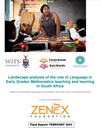As part of this research, we are interested in understanding the following: What role has culture played in affecting responses to the crisis by both governments and the governed? How have cultural practices been adapted in response to the spread of the pandemic? What means and avenues were leveraged to initiate social responses?
In the context of this research, culture is defined as the way of life, including the customs, beliefs, and traditions, of a particular group of people at a particular time. Culture also encompasses religion, food, art, fashion, language, patterns of work and leisure and social habits all learned through socialisation. Importantly, the education system in a country is representative of the prevailing culture in a specific context and entrenches a certain culture within society. Education systems are one of the crucial venues through which individuals engage society, and schools form avenues for cultural engagement as community institutions. Given the interconnected world that we live in, culture is a fluid concept that changes as our interactions progress.
The study uses two frameworks to analyse the responses of a limited number of African and non-African countries, focusing on a few themes and lessons that may assist African governments. It develops a Government Counter COVID Intervention Framework and refers to the Oxford COVID-19 Government Response Tracker.
To contribute to finding solutions to the pressures placed on education systems during times of crisis, by investigating the best mega-, meta- and micro-level education strategies.
Education Researchers Respond to The COVID-19 Pandemic. This document reports the findings of (1) a desktop review on Grade R–12 and early childhood development (ECD) teaching and learning resources available for teachers, learners and parents; and (2) an online survey researching levels of access and engagement of teachers, learners and parents. This review forms part of a larger research project which aims to contribute meaningfully to finding solutions to the pressures being placed on education systems, by investigating the best mega-, meta- and microlevel education strategies that can be used during times of crisis.
Identify and understand examples of the use of self-sovereign identity (SSI) in education internationally, and instances in which data ownership and control have been successfully decentralised.
Researchers Bootcamp Theme 8: To investigate how higher education institutions are managing the risks and impact of COVID-19.
Education Researchers Respond to The COVID-19 Pandemic. The main purpose of this research project is to allow praxis to inform policy by outlining the courses of action that institutions are implementing in South Africa. While it is understood that the reality of each institution is unique, it is hoped that this project will highlight issues of governance and management during these times as we all continue to learn while the COVID-19 situation unfolds.
In this paper we examine the effects of school closures amidst the pandemic, the effectiveness of remote learning and the possibility of remaking schooling in the South African context.
The Teacher Internship Collaboration South Africa (TICZA) stakeholder map
The Teacher Internship Collaboration South Africa (TICZA) Theory of Change (TOC)
A call for proposals for a service provider to developm a platform
JET and the merSETA seek to appoint a qualified and expert service provider to (i) develop an appropriate and up-to-date Enterprise Architecture (EA) within and for the merSETA that will provide reliable architecture information; and (ii) develop a realistic roadmap as well as a detailed and costed implementation and mitigation plan.
Towards a theory of change
Paper commissioned by the National Education Collaboration Trust (NECT) following the Education NGO Leadership Summit convened by the NECT in March 2016.
This contribution draws on a study visit to a number of American Community Colleges in the US in September 2014 as part of JET’s aim to contribute to the national and international debate on skills development and youth unemployment.
Published by JET Education Services edited by Andre Kraak, Andrew Paterson and Kedibone Boka
Paterson, A., Keevy, J. & Boka, K. Johannesburg: JET Education Services. October 2017.
JET Bulletin August 2015: FOCUS: Improving students’ performance in TVET colleges
Save the Dates: 12 December 2021, 18 December 2021, 18 January 2022
JET Education Services celebrates World Youth Skills Day 2021 alongside UNESCO-UNEVOC
JET Education Services celebrates World Youth Skills Day 2019 alongside UNESCO-UNEVOC
Registration is now open for UNESCO's Youth as Researchers (YAR) COVID-19 Knowledge-Sharing Meeting taking place 5 - 7 October 2021
A research project designed to understand how elements of trust, capacity and accountability connect and impact on learning outcomes in primary schools.
New Publication NSI 08 : The Education-Training-Work Continuums: Pathways to Socio-Professional Inclusion for Youth and Adults
y Anthony A Essien (Wits), Ingrid Sapire (Funda Wande, Wits), Nick Taylor (JET Education Services)
Digital transformation is a complex process that with varying impacts across economic sectors. In the education and training sector, digital transformation in TVET can involve TVET operational systems (administration, finance, human resources, building infrastructure and maintenance, student registration, etc.); classroom delivery (learning management, instructional delivery methods, etc.); and the actual knowledge and skill component of the curriculum, for example by integrating productivity software such as word processors or spreadsheets into students’ learning outcomes. The integration of digital skills in the TVET curriculum allows learners to acquire the changing skills and knowledge (tacit and explicit) required to function in a digitalizing society, economy and labour market. Digital transformation in TVET is also transforming the dominant modalities of traditional face-to-face learning and teaching to involve multiple configurations of actors (learners, teachers and technologies/apps) in space and time (when, where, who, how). This means that digital transformation in TVET offers opportunities for teachers to reconsider their pedagogical assumptions, behaviours and relationships with students.
For over three decades, JET has worked with government and the public sector, civil society organisations, local and international development agencies and educational institutions to improve the quality of education and the overall relationship between education, skills development and the world of work.






















